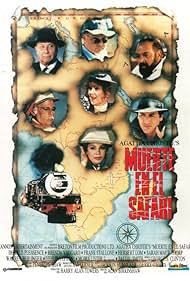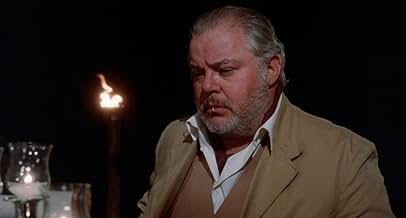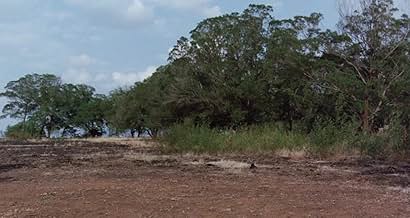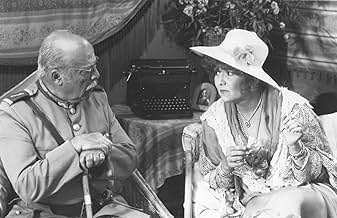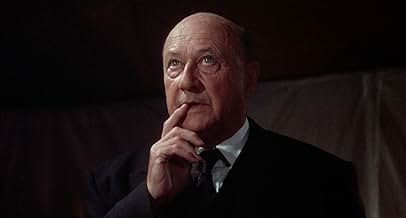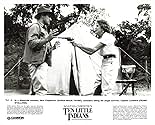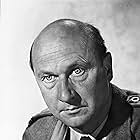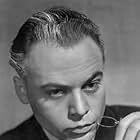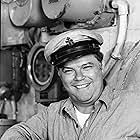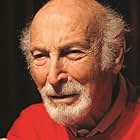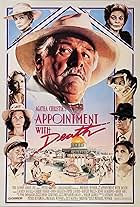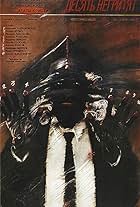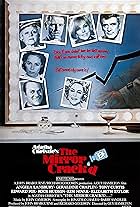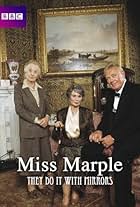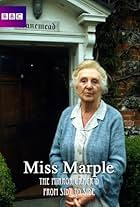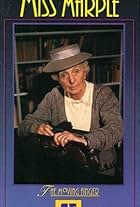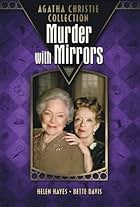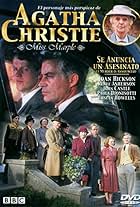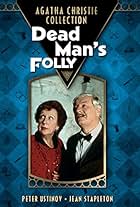IMDb RATING
4.7/10
1.7K
YOUR RATING
Ten people are invited to go on an African safari, only to find that an unseen person is killing them one by one. Could one of them be the killer?Ten people are invited to go on an African safari, only to find that an unseen person is killing them one by one. Could one of them be the killer?Ten people are invited to go on an African safari, only to find that an unseen person is killing them one by one. Could one of them be the killer?
Sarah Maur Ward
- Vera Claythorne
- (as Sarah Maur Thorp)
Candice Hillebrand
- Schoolgirl at Train Window
- (uncredited)
- Director
- Writers
- All cast & crew
- Production, box office & more at IMDbPro
Storyline
Did you know
- TriviaThe original script was much more faithful to the original Agatha Christie novel with the setting on an island and the original grim conclusion of the book. However, producer Harry Alan Towers changed it at the last second when he realized that it would be cheaper to shoot in the African outback and that the novel's ending is less marketable than Christie's happier resolution from the play version of the story.
- GoofsWhen the survivors are burying the first victim, one of them comments that they "didn't even know" the person's first name. During the accusation scene, all ten characters are present and all ten characters' full names are used, but perhaps that person forgot due to the stress (or the copious amount of alcohol they drank), or they weren't paying attention during the recording.
- Quotes
Anthony Marston: Well, well. It appears no one knows our host. How gauche. Do I hear a martini calling?
- ConnectionsFeatured in Banánové rybicky: Jak prezít manzelství (1999)
- SoundtracksMad Dogs And Englishmen
Written, Performed and Produced by Noël Coward
Also performed by Neil McCarthy
Featured review
The 1989 film has some good points, but, unlike the 1945, 1965, and 1974 versions, it grows less enjoyable with each viewing. Everything about it seems low-budget. The cast and script are undistinguished. The set is drab. The clothes look like cheap costumes. The plot takes too long to get going. Once it does, it unfolds well at first, with the early deaths resembling accidents. And, bettering all prior versions, the ending is dramatic, conveys murderous host Owen's menace and lunacy, and most fully explains Owen's behavior.
Overall, however, the storytelling is inept. Too much is out of Owen's control, such as natives cutting down the basket that carries people down from the cliff and Lombard repairing the radio. After the third death, someone abruptly announces without any discussion or reasoning that "Mr. Owen is one of us." Unlike the other versions, the characters engage in no deductive reasoning or survival techniques.
The story drags. Only making matters worse are cheap, forced attempts to gin up suspense. These include the camera suddenly coming up short on characters; a character acting "awfully nervous" for no reason; and pratfall-type death scenes, with a body tumbling down from on top of a tent, another toppling out of a closet, mouth gaping, and another slumping forward with an ax in the back of the head.
Touches that made earlier versions entertaining are botched in 1989. The other films recite the full nursery rhyme up front, creatively playing it on the piano. But this script dribbles the rhyme out line by line upon each murder. Instead, it chooses to play "Mad Dogs and Englishmen," an annoying, madcap, out-of-place Noel Coward song with no apparent connection to Christie or appropriateness to this adaptation, which has so few British characters. This film makes an embarrassing hash of the scene in which the phonograph record is played accusing each person of a past crime. Repeatedly, the person whose name is unexpectedly about to be called next happens to pipe up with some exaggerated utterance, on cue, right before being named.
The 1989 film fails to discuss some past crimes at all (doctor, judge, Lombard). It distorts others (Blore, Marshall), to no good effect. In place of Christie's subtle crime of withheld care, Rodgers merely refers to an old lady in his care who "died of a massive stroke." In the film, Marston refers to a "couple running out in front of his car," without any mention of them being newlyweds or of him driving fast and drunk. The film dumbs down the book's most complex, interesting past crime to a bland reference to a child in Vera's care drowning.
All the good lines from other versions are gone in 1989, like "a feeling that some sort of macabre joke is being played on us," "game of the mind." In 1989, other than Owen's line "My own private big game hunt," there are just limp banalities ("The devil is among us"; Our duty, that's all any of us can hope to do"; "I never bet"; "When we get out of here, I'm going to teach you to shoot straight") or lines memorable only for making you cringe (judge, "I left immediately...to relieve myself"; Lombard to Vera, "Feel it, smell it," about gun).
In 1989, the casting and acting, strong points in past adaptations, go badly awry. An exception is Herbert Lom's delightfully dotty performance as the general, better than 1945, including a touching scene with Vera explaining his past. But Donald Pleasance is adrift, mostly acting detached and insipid, then suddenly erupting in a panic outburst or frantically pawing in a snuff box. Not until his final moments on screen does he play his character coherently and effectively.
Sarah Maur Thorp brings youthful energy and emotion to the role of Vera. But her acting becomes erratic and mechanical as she turns increasingly into a mere screaming hysteric, unlike June Duprez, who keeps a strong, intelligent presence during the 1945 film.
Brenda Vaccaro's uninspired, formless performance as actress Marshall consists of sighing, huffing, lounging around, and boozing. It is unbelievable that this plump, pampered lush would go on an African safari. Her only explanation? "I was invited. I received a letter in the post."
Blore's character has always been well-defined and well-acted before. But here, played by a bit-part TV character actor, he is just roly-poly, rough, loud, and sulky. His mumbled confession of his past crime is confused and miserably ineffective.
Marston, who rushes through a 2-second singing bit, the worst musical performance of any version, is a caricature of a fop. The film fails to place him in the context of a dissolute career or even mention his penchant for liquor and fast sportscars.
Paul Smith as Rodgers tries to let his hulking body do his acting for him, as Moira Lister, the wife, does with her shrill voice. He lumbers around scowling and bellowing laconically. She overacts as a loud, whiny motormouth. Their characters and relationship are not remotely believable.
Apparently, Frank Stallone's only qualification for Lombard was being a "hunk." His weak, vacant expressions and flat delivery are evident from his very first line. His acting is exemplified by the scene in which he shoves a pistol in Vera's face and cocks the trigger, oblivious that he has already started mouthing the line, "I'm sorry, I didn't mean to scare you." Stallone's constant, supposedly sly, cocky grins destroy any sense of suspense. His only explanation for being there: "Owen had already paid [a friend's] way out, so I came instead."
Worst of all, Yehuda Efroni ruins the important character of the doctor. His bizarre, introverted, bug-eyed portrayal lacks any air of authority, intellect, charm, or even social skills. Through a heavy accent, he either stammers or, like a snapping turtle, spits out snippets of inarticulate dialogue. At one point, he cackles, at another acts befuddled, for no reason at all. Unlike any prior version, the doctor has no rapport with any other character.
Overall, however, the storytelling is inept. Too much is out of Owen's control, such as natives cutting down the basket that carries people down from the cliff and Lombard repairing the radio. After the third death, someone abruptly announces without any discussion or reasoning that "Mr. Owen is one of us." Unlike the other versions, the characters engage in no deductive reasoning or survival techniques.
The story drags. Only making matters worse are cheap, forced attempts to gin up suspense. These include the camera suddenly coming up short on characters; a character acting "awfully nervous" for no reason; and pratfall-type death scenes, with a body tumbling down from on top of a tent, another toppling out of a closet, mouth gaping, and another slumping forward with an ax in the back of the head.
Touches that made earlier versions entertaining are botched in 1989. The other films recite the full nursery rhyme up front, creatively playing it on the piano. But this script dribbles the rhyme out line by line upon each murder. Instead, it chooses to play "Mad Dogs and Englishmen," an annoying, madcap, out-of-place Noel Coward song with no apparent connection to Christie or appropriateness to this adaptation, which has so few British characters. This film makes an embarrassing hash of the scene in which the phonograph record is played accusing each person of a past crime. Repeatedly, the person whose name is unexpectedly about to be called next happens to pipe up with some exaggerated utterance, on cue, right before being named.
The 1989 film fails to discuss some past crimes at all (doctor, judge, Lombard). It distorts others (Blore, Marshall), to no good effect. In place of Christie's subtle crime of withheld care, Rodgers merely refers to an old lady in his care who "died of a massive stroke." In the film, Marston refers to a "couple running out in front of his car," without any mention of them being newlyweds or of him driving fast and drunk. The film dumbs down the book's most complex, interesting past crime to a bland reference to a child in Vera's care drowning.
All the good lines from other versions are gone in 1989, like "a feeling that some sort of macabre joke is being played on us," "game of the mind." In 1989, other than Owen's line "My own private big game hunt," there are just limp banalities ("The devil is among us"; Our duty, that's all any of us can hope to do"; "I never bet"; "When we get out of here, I'm going to teach you to shoot straight") or lines memorable only for making you cringe (judge, "I left immediately...to relieve myself"; Lombard to Vera, "Feel it, smell it," about gun).
In 1989, the casting and acting, strong points in past adaptations, go badly awry. An exception is Herbert Lom's delightfully dotty performance as the general, better than 1945, including a touching scene with Vera explaining his past. But Donald Pleasance is adrift, mostly acting detached and insipid, then suddenly erupting in a panic outburst or frantically pawing in a snuff box. Not until his final moments on screen does he play his character coherently and effectively.
Sarah Maur Thorp brings youthful energy and emotion to the role of Vera. But her acting becomes erratic and mechanical as she turns increasingly into a mere screaming hysteric, unlike June Duprez, who keeps a strong, intelligent presence during the 1945 film.
Brenda Vaccaro's uninspired, formless performance as actress Marshall consists of sighing, huffing, lounging around, and boozing. It is unbelievable that this plump, pampered lush would go on an African safari. Her only explanation? "I was invited. I received a letter in the post."
Blore's character has always been well-defined and well-acted before. But here, played by a bit-part TV character actor, he is just roly-poly, rough, loud, and sulky. His mumbled confession of his past crime is confused and miserably ineffective.
Marston, who rushes through a 2-second singing bit, the worst musical performance of any version, is a caricature of a fop. The film fails to place him in the context of a dissolute career or even mention his penchant for liquor and fast sportscars.
Paul Smith as Rodgers tries to let his hulking body do his acting for him, as Moira Lister, the wife, does with her shrill voice. He lumbers around scowling and bellowing laconically. She overacts as a loud, whiny motormouth. Their characters and relationship are not remotely believable.
Apparently, Frank Stallone's only qualification for Lombard was being a "hunk." His weak, vacant expressions and flat delivery are evident from his very first line. His acting is exemplified by the scene in which he shoves a pistol in Vera's face and cocks the trigger, oblivious that he has already started mouthing the line, "I'm sorry, I didn't mean to scare you." Stallone's constant, supposedly sly, cocky grins destroy any sense of suspense. His only explanation for being there: "Owen had already paid [a friend's] way out, so I came instead."
Worst of all, Yehuda Efroni ruins the important character of the doctor. His bizarre, introverted, bug-eyed portrayal lacks any air of authority, intellect, charm, or even social skills. Through a heavy accent, he either stammers or, like a snapping turtle, spits out snippets of inarticulate dialogue. At one point, he cackles, at another acts befuddled, for no reason at all. Unlike any prior version, the doctor has no rapport with any other character.
- delatorrel
- Nov 17, 2003
- Permalink
- How long is Ten Little Indians?Powered by Alexa
Details
Box office
- Gross US & Canada
- $59,405
- Opening weekend US & Canada
- $43,436
- Nov 12, 1989
- Gross worldwide
- $59,405
- Runtime1 hour 40 minutes
- Color
- Sound mix
Contribute to this page
Suggest an edit or add missing content

